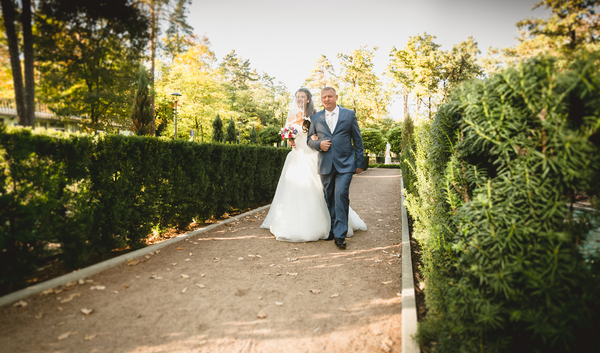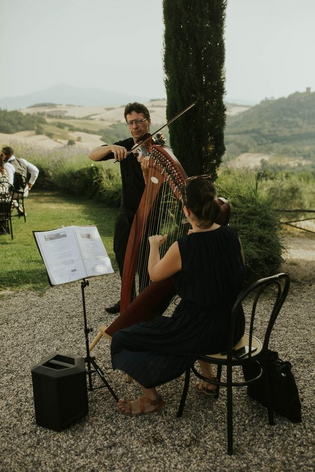- Introduction
- Understanding the Role of Music at High-End Weddings
- Determining the Musical Style and Genres for Your Wedding
- Ceremony Music Selection
- Reception Music Selection
- The Art of Sequencing Wedding Music
- Practical Considerations in Selecting and Coordinating Music
- Working with Professionals
- Conclusion
- Appendix: Wedding Music Checklist
- Frequently Asked Questions
Source: Pintrest
Introduction
Planning a luxury wedding demands meticulous attention to detail to ensure the event is spectacular. One critical aspect of this planning revolves around the musical ambiance of the occasion. The proper musical selection and coordination can significantly elevate the experience, reflecting the elegance and sophistication that a high-end event demands. This guide offers a deep dive into navigating the musical landscape for your luxury wedding, ensuring that every note strikes a chord of exclusivity and elegance.
The Importance of Selection and Coordination of Wedding Music
Music is not merely a backdrop; it is a character in the narrative of your wedding day. The proper selection and coordination of music contribute to a seamless flow of events, evoking emotions and connecting with your guests profoundly. It sets the tone, ignites conversations, and creates memorable experiences long after playing the last note.
Understanding the Role of Music at High-End Weddings
High-end weddings are a league apart regarding the role of music. It’s about crafting a signature experience that reflects the tastes and preferences of the hosts while ensuring an engaging, enjoyable atmosphere for the guests.
Significance of Music in Creating the Ambiance
At luxury weddings, music does more than fill the silence; it crafts the ambiance, accentuates the theme, and amplifies the event’s elegance. Whether it’s the soft serenade of a violin during the exchange of vows or the energetic beats that fuel the dance floor, every musical element should be curated to perfection.
Role of Music in Enhancing the Guest Experience
The guest experience at a high-end wedding should be nothing short of sublime. Music plays a pivotal role in this regard. It’s not only about what is being played but how it’s being played and coordinated. Seamless transitions between different phases of the event, the right volume levels, and the apt choice of genres can significantly enhance the guest experience, making your wedding a cherished memory for all in attendance.
Determining the Musical Style and Genres for Your Wedding
Your wedding is a reflection of your personality and taste. The musical genres you choose should resonate with your persona while aligning with the elegance and sophistication of a high-end event.
Choosing the Right Genres to Reflect Your Personality
Whether you love classical music, jazz, pop, or electronic beats, ensuring the musical selection mirrors your taste is crucial. However, it’s not just about personal preference; it’s about blending your style with the aesthetics of a luxury wedding. A well-curated playlist can seamlessly weave your personality into the fabric of the event, creating a unique, personalized ambiance.
Balancing Your Preference with Music that Fits the Event
Striking the right balance between personal preference and music that complements the event’s upscale nature is crucial. It’s about ensuring that the music enhances the event’s aesthetic, whether it’s a garden, classic, or modern wedding. Consulting with professional musicians or a wedding planner with expertise in high-end events can provide invaluable insights into creating a musical experience that is as unique and sophisticated as your wedding.
Ceremony Music Selection
The ceremony is the heart of your wedding, where emotions run high and lifetime vows are exchanged. The music chosen for this segment should reflect your tastes and the solemnity and joy of the occasion.
Traditional Wedding Ceremony Music Choices
Traditional music exudes a timeless elegance, making it a popular choice for luxury weddings. Standard selections include compositions by Bach, Handel, or Vivaldi. A well-coordinated performance by a string quartet or a harpist can add a classical touch that resonates with the formality and grace of a traditional ceremony.
Contemporary Wedding Ceremony Music Choices
Contemporary music offers a broad palette of options for a more modern flair. Acoustic renditions of popular songs or orchestral covers of modern hits can lend a fresh yet refined ambiance. A professional ensemble or a skilled pianist can deliver a modern musical experience while maintaining an air of sophistication crucial for a high-end wedding.
Tailoring Your Ceremony Music to Fit the Theme and Mood
Your ceremony music should be in harmony with the theme and mood of your wedding. Whether you opt for traditional or contemporary music, ensuring it melds seamlessly with your chosen aesthetic—garden, classic, or modern—is crucial. Tailor your music to highlight the critical moments of the ceremony, such as the processional, the exchange of vows, and the recessional, to evoke the desired emotions and create a memorable ambiance.
Reception Music Selection
The reception is where the celebration truly kicks off. The music during this part of your event should uplift, entertain, and resonate with the joyous spirit of the occasion.
Opting for a Live Band or a DJ
Choosing between a live band and a DJ is pivotal in setting the tone for your reception. A live band offers a rich, authentic sound and a visually engaging performance. At the same time, a DJ provides a vast array of music and the ability to switch between genres effortlessly. Your choice should align with your event’s desired ambiance and theme.
Ensuring Variety in Reception Music
Variety is the spice of a memorable reception. A well-curated mix of genres—from timeless classics to contemporary hits—can cater to the diverse tastes of your guests, keeping the energy high and the dance floor bustling.
The Importance of Dancefloor Hits
Dancefloor hits are the lifeblood of a lively reception. Selecting universally loved tracks with an infectious beat can ignite the dance floor, creating unforgettable moments of joy and celebration.
The Do-Not-Play List: Setting Boundaries
A Do-Not-Play list is as crucial as your playlist. It ensures that the music remains in harmony with your preferences and the upscale nature of the event. Communicate with your band or DJ about any songs or genres that you prefer to avoid, ensuring that the musical ambiance remains refined and enjoyable.
The Art of Sequencing Wedding Music
Sequencing is the fine art of arranging music to create a cohesive and enjoyable musical journey from the ceremony to the reception.
Coordinating Ceremony and Reception Music
A seamless transition from the ceremony to the reception is critical to maintaining the flow and energy of the event. Coordinating the music such that it evolves from a serene and solemn tone during the ceremony to a lively and upbeat vibe at the reception can significantly enhance the guest experience.
Timing Your Music: Walk-in, First Dance, Cake Cutting, and Beyond

Timing is everything when it comes to wedding music. Coordinating the music with the day’s various events—from the walk-in and first dance to the cake-cutting and farewell—ensures a smooth, enjoyable event progression. It’s about creating a harmonious thread that ties all the moments of your wedding into a beautiful musical narrative.
Practical Considerations in Selecting and Coordinating Music
The journey of orchestrating an impeccable musical ambiance extends beyond selecting genres and artists. It delves into the practical realm, addressing budgetary concerns, venue coordination, and legal considerations to ensure a seamless musical experience.
Budgeting for Your Wedding Music
Allocating a budget for your wedding music is a crucial step in the planning process. High-end events often have a larger budget, allowing for live bands, orchestras, or renowned DJs. It’s essential to outline a budget that accommodates your musical desires while aligning with the overall financial blueprint of your wedding.
Discussing Your Music Choices with the Venue Manager
Engaging with the venue manager to discuss your music choices is paramount. Some venues may have restrictions on the type of music, volume levels, or the timing of musical performances. A transparent dialogue is advisable to understand these restrictions and plan your musical itinerary accordingly.
Licensing Considerations for Publicly Performing Music
Licensing is a legal requisite for publicly performing music. Ensure that the licenses from performing rights organizations are secured to avoid legal complications. This aspect is often overlooked but is crucial to ensure a hassle-free musical experience.
Working with Professionals
Entrusting professionals with the task of orchestrating the music for your wedding can significantly ease the planning process, ensuring a polished, professional musical ambiance.
The Role of a Wedding Planner in Music Selection and Coordination
A seasoned wedding planner with experience in high-end events can be invaluable. They can guide you through the selection process, recommend reputable musicians or DJs, and coordinate with the venue to ensure a seamless musical experience. Their expertise can help align the music with the grandeur and elegance synonymous with luxury weddings.
Tips on Communicating Your Musical Vision to the Band or DJ
Effective communication of your musical vision to the band or DJ is crucial. Share your preferred playlist, special song requests for critical moments, and any genres or songs you want to avoid. Discussing the desired vibe for different event segments is beneficial to ensure the music complements the mood.
Conclusion
Reflecting on the journey of selecting and coordinating music for your high-end wedding, the focus is crafting a musical ambiance that resonates with your union’s elegance, joy, and unique personality.
Ensuring Your Music Leaves Lasting Memories
The essence of a well-curated musical ambiance is about creating lasting memories. Each note should echo your celebration’s love, joy, and majestic nature, leaving you and your guests with cherished memories.
The Ultimate Goal: Enjoying Your Big Day
Amidst the meticulous planning and coordination, the ultimate goal is to revel in the joy of your big day. A well-orchestrated musical backdrop will enhance the event’s elegance and allow you to immerse in the celebration, creating unforgettable moments of joy and love.
Appendix: Wedding Music Checklist
As a parting gift, including a comprehensive checklist can ensure every musical detail is noticed. From selecting the genres and artists to coordinating with the venue and securing necessary licenses, a checklist can be a handy tool in navigating the musical landscape of a high-end wedding.
Frequently Asked Questions
How early should I start planning the music for my wedding?
It’s advisable to start planning your wedding music as soon as a date and venue are confirmed. Typically, 6 to 12 months in advance is a suitable timeframe. This allows enough time to research, listen to different bands or DJs, and ensure your first choice is available on your big day.
How do I ensure the music matches the theme and style of my high-end wedding?
Collaboration with experienced wedding planners, musicians, or DJs who thoroughly understand high-end events can be invaluable. They can provide insights and suggestions on musical genres, artists, and performances that will complement the elegance and theme of your high-end wedding.
What is the average cost of wedding music for a high-end event?
The cost can vary significantly based on factors such as the band or DJ’s reputation, the performance’s duration, and the location of your wedding. It’s essential to allocate a realistic budget for music, considering it’s a vital element in creating the ambiance for your event.
Live band or DJ: Which is better for a high-end wedding?
Both options have their merits. A live band offers a rich, authentic sound and a visually engaging performance, ideal for a classic or formal ambiance. On the other hand, a DJ provides a vast array of music and the ability to switch between genres effortlessly, which might suit a modern or vibrant setting better. Your choice should align with your event’s desired ambiance, theme, and personal preferences.
How can I ensure a smooth transition between different musical phases on my wedding day?
Effective communication and meticulous planning are key to ensuring smooth transitions between different musical phases. Work closely with your wedding planner, band, or DJ to create a detailed schedule that outlines when each musical segment will begin and end.
Additionally, having a clear plan for transitioning from live music to recorded music or from one musical act to another is crucial. Conducting a run-through with all involved parties a few days before the wedding can also help iron out any potential issues and ensure everyone is on the same page regarding the musical transitions.

